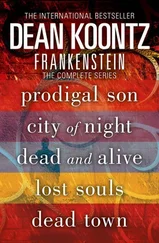He didn't rely on sounds to help him find his way, though here and there one served as a marker of his progress. Twelve paces from his room, a floorboard squeaked almost inaudibly under the hallway carpet, which told him that he was seventeen paces from the head of the stairs. He didn't need that muffled creak to know exactly where he was, but it always reassured him.
Six paces past that marker floorboard, Barty had the strangest feeling that someone was in the hallway with him.
He didn't rely, either, on a sixth sense to detect obstacles or open spaces, which some blind people claimed to have. Sometimes instinct told him that in his path was an object that ordinarily would not have been there; but as often as not, it went undetected, and unless he was using his cane, he tripped over it. The sixth sense was greatly overrated.
If someone were here in the hallway with him, it couldn't be Angel, because she would be chattering enthusiastically in one voice or another. Uncle Jacob would never tease him like this, and no one else was in the house.
Nevertheless, he stepped away from the wall, and with his hands extended to full arm's length, he turned, feeling the lightless world around him. Nothing. No one.
Shaking off this peculiar case of the spooks, Barty proceeded toward the stairs. Just when he reached the newel post, he heard the faint creak of the marker floorboard behind him.
He turned, blinking his plastic eyes, and said, “Hello?"
No one answered.
Houses made settling noises all the time. That was one reason why he couldn't rely much on sound to guide him through the darkness. A noise he thought had been made by the weight of his tread might as easily have been produced by the house itself as it adjusted to the “Hello?” he said again, and still no one answered.
Convinced that the house was playing tricks on him, Barty went downstairs, step by measured step, to the foyer and the ground-floor hall.
As he passed the living-room archway, he said, “Watch out for tidal waves, Uncle Jacob."
Captivated by catastrophe, so lost in his book that he might as well have stepped magically inside of it and closed the covers after himself, Uncle Jacob didn't answer.
Barty paced off the downstairs hallway to the kitchen, thinking about Dr. Jekyll and the hideous Mr. Hyde.
LEFT HAND ON the banister, right hand with knife tucked close to his side and ready to thrust, Tom Vanadium climbed cautiously but quickly to the upper floor, glancing back twice to be sure that Cain didn't slip in behind him.
Along the hall to his room. Fast and low through the doorframe. Wary of the closet door standing two inches ajar.
All the way to the nightstand, he expected to discover that the revolver had been taken from the drawer. Yet here it was. Loaded.
He dropped the knife and snatched up the handgun.
Almost thirty years from the seminary—even farther from it if measured by degrees of lost innocence, by miles of rough experience Tom Vanadium set out to kill a man. Given the chance to disarm Cain, given the opportunity to merely wound him, he would nevertheless go for the head shot or the heart shot, play jury and executioner, play God, and leave to God the judgment of his stained soul.
Room to room through the upstairs. Checking closets. Behind furniture. Bathrooms. In Paul's private spaces. No Cain.
Down the stairs, through the ground floor, quickly, soundlessly, breath held at times, listening for the other's breathing, listening for the softest squeak of rubber-soled shoes, although the hard clack of cloven hoofs and a whiff of sulfur would not have been surprising. At last he went to the kitchen, full circle from the shiny quarter on the breakfast table to the quarter again. No Cain.
Perhaps these two months of frustration had brought him to this: hair-trigger nerves, fevered imagination, and anticipation distilled into dread.
He might have felt properly foolish if he had not suffered so much personal experience of Enoch Cain. This was a false alarm, but considering the nature of the enemy, it wasn't a bad idea to put himself through a drill from time to time.
Laying the gun on the newspaper, he dropped into the chair. He picked up his coffee. The search of the house had been conducted with such urgency that the java was still pleasantly hot.
Holding the mug in his right hand, Tom picked up the coin and rolled it across the knuckles of his left. Paul's quarter, after all. A two-bit temptation to panic. As gifted with physical grace as with good looks, Junior stepped into the bedroom doorway, lithely and with feline stealth. He leaned against the jamb.
Across the room, the girl on the window seat showed no awareness of his arrival. She sat sideways to him in the niche, with her back against one wall, knees drawn up, a big sketch pad braced against her thighs, working intently with colored pencils.
Through the big window beyond her, the charry branches of the massive oak tree formed a black cat's cradle against the sky, leaves quivering slightly, as though nature herself trembled in trepidation of what Junior Cain might do.
Indeed, the tree inspired him. After he shot the girl, he would open the window and toss her body into the oak Let Celestina find her there, randomly pierced by branches in a freestyle crucifixion.
His daughter, his affliction, his millstone, granddaughter of the boil-giving voodoo Baptist ...
After a surgeon had lanced fifty-four boils and cut the cores from the thirty-one most intractable (shaving the patient's head to get at the twelve that were festering on his scalp), and after three days of hospitalization to guard against staphylococcus infection, and after he had been turned back into the world as bald as Daddy Warbucks and with the promise of permanent scarring, Junior visited the Reno library to catch up with current events.
Reverend White's murder received significant coverage throughout the nation, especially in West Coast papers, because of its perceived racial motivation and because it involved the burning of a parsonage.
Police identified Junior as the prime suspect, and newspapers featured his photograph in most stories. They referred to him as “handsome,"
” dashing,"
” a man with movie-star good looks.” He was said to be well known in San Francisco's avant-garde arts community. He got a thrill when he discovered that Sklent was quoted as calling him “a charismatic figure, a deep thinker, a man — with exquisite artistic taste .... so clever he could get away with murder as easily as anyone else might get away with double-parking. “
” It's people like him,” Sklent continued, “who confirm the view of the world that informs my painting."
Junior found the acclaim gratifying, but the widespread use of his photograph was a high price to pay even for the recognition of his contribution to art. Fortunately, with his bald head and pocked face, he no longer resembled the Enoch Cain for whom the authorities were searching. And they believed that the bandages on his face, at the church, had been merely an exotic disguise. One psychologist even speculated that the bandages had been an expression of the guilt and shame he felt on a subconscious level. Yeah, right.
For Junior, 1968-the Chinese Year of the Monkey—would be the Year of the Plastic Surgeon. He would require extensive dermabrasion to restore the smoothness and tone to his skin, to be as irresistibly kissable as he had been before. While at it, he would need surgery to make subtle changes in his features. Tricky. He didn't want to trade perfection for anonymity. He must take care to ensure that his postsurgery look, when he let his hair grow in and perhaps dyed it, would be as devastating to women as his previous appearance.
Читать дальше











